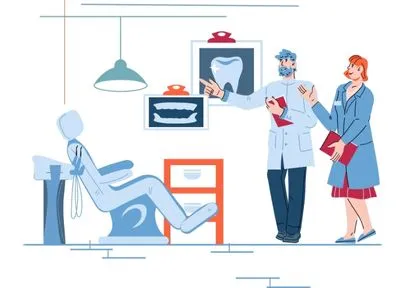Qualities To Look For In An Endodontist
The skills required for an endodontist positions go far beyond just clinical expertise. Dental practices across the U.S. are actively seeking professionals who not only excel in root canal therapy and other complex procedures but also bring a strong set of interpersonal, technical, and diagnostic abilities to the table.In today’s competitive dental job market, endodontists need to demonstrate a well-rounded skill set that includes both hard and soft skills, ranging from precision and patience to adaptability and communication.
In this blog, we’ll explore the top qualities of a successful endodontist that a dental practice looks for when hiring endodontists, helping both new graduates and experienced specialists better align their strengths with employer expectations. Whether you’re preparing for an interview or updating your resume, understanding these key skills can give you a clear edge in your endodontic career.
What do dental clinics look for in endodontists?

To stand out in today’s competitive dental field, mastering the essential skills required for endodontist roles is crucial. These skills ensure quality care and better patient outcomes.
1. Clinical Competence and Accuracy: Clinical excellence is anticipated by dental practice from endodontists in root canal treatment and endodontic microsurgery.
Strong clinical competence is one of the most critical requirements for endodontist jobs. Employers are looking for precision in procedure, secure diagnosis, and sound knowledge of new instruments and technology in endodontics.
2. Effective Communication Skills: Effective communication enables endodontists to communicate treatments and calm patient nerves. Among the best traits of an effective endodontist is the ability to speak clearly to patients and staff members. Dental clinics desire professionals who can explain treatment options, calm patient inquiries, and reassure them throughout the process.
3. Problem-Solving Skills: Endodontists usually encounter challenging cases that demand innovative thinking and sound judgment. Problem-solving is greatly appreciated in dental practices as a requirement for the job of an endodontist. Rapid thinking, resilience in the face of changing situations, and efficient interpretation of X-rays and symptoms are essential skills clinics seek in their recruits.
4. Attention to Detail: Accuracy is essential in endodontics, particularly during surgeries and root canal procedures. Sharp observation skills are among the essential abilities demanded by endodontist positions. A tiny error can create ongoing patient pain. That’s why US clinics are inclined toward people who persistently show thoughtful planning and workability.
5. Empathy and Patient-Focused Care: Dental clinics today desire practitioners with empathy for the patient’s fear and pain. Some of the things dental clinics seek in endodontists are interpersonal skills. Endodontists who empathize and describe procedures in understanding and gentle language tend to gain greater trust and loyalty from patients.
6. Commitment to Continuing Education: It is imperative to stay abreast of the latest research and trends in endodontics. Endodontist work requirements nowadays include more than education. Most clinics promote or mandate endodontists to attend continuing education to retain licensure and guarantee that up-to-date treatment practices are implemented.
7. Technological Competency: Current dental clinics are dependent on digital imaging, 3D scans, and state-of-the-art treatment equipment. One of the best traits of an effective endodontist is familiarity with current dental technology. The ability to use advanced instruments and knowledge of software for diagnosis and treatment can make applicants stand out.
8. Team Work Ability: Working with dental assistants, general dentists, and office staff is essential. Dental practices not only evaluate individual competence, they also look at how well endodontists work as part of a team. Being respectful, responsive, and collaborative are essential skills needed for endodontist roles in group practices or larger clinics.
9. Time Management: Effective scheduling and treatment planning contribute to enhanced patient flow and satisfaction. What endodontists seek in dental clinics also involves time management. The ability to handle several cases within a day without compromising quality is a good indication of productivity and professionalism.
10. Professionalism and Standards of Ethics: Maintenance of dental ethics, hygiene, and patient confidentiality fosters long-term trust. Requirements for endodontist jobs also highlight professionalism. Clinics expect specialists to abide by guidelines from regulators, have hygienic working areas, and provide honest communication with patients.
Read More: Highest Paying Dental Jobs Salaries in USA (2025)
Endodontist Job Requirements: Key Qualifications You Need

1. DDS or DMD Degree
You need to possess a Doctor of Dental Surgery (DDS) or Doctor of Dental Medicine (DMD) degree from a U.S.-accredited dental school.2. Specialized Endodontic Training
Completion of a postgraduate endodontic residency program (typically 2–3 years) is necessary to acquire advanced clinical skills in root canal therapy, endodontic retreatment, and microsurgery.3. Board Certification (Preferred)
Certification by the American Board of Endodontics is optional, but it increases credibility and shows your commitment to the best standards of care.4. State Dental License
You will need to secure a current dental license to practice within the state where you will be employed. There are some additional endodontic credentials that can be required by certain states.5. Excellent Diagnostic and Clinical Skills
One of the key Endodontist job requirements is the skill to diagnose difficult dental pain and execute precision procedures using sophisticated instruments such as dental microscopes and digital radiography.6. Manual Dexterity and Attention to Detail
Endodontic treatments require utmost precision. Superb hand-eye coordination and steady hands are necessary for effective treatments.7. Patient Communication Skills
You need to be able to communicate procedures, risks, and post-operative care effectively to patients, under pressure or anxious conditions.Final thought on top qualities of a successful endodontist

The need for skilled endodontists in the US is on the increase, but dental practices are becoming more discerning. Knowing the skills needed to succeed as an endodontist can position you as the best candidate. Whether through technical proficiency, compassionate patient care, or dedication to continuous learning, acquiring these skills will open more career opportunities and boost your professional image.
If you’re an aspiring or practicing endodontist, now is the time to focus on building the skills dental clinics truly value. Take action by investing in advanced training, joining dental associations, or consulting mentors in your field.
And when you’re ready for your next opportunity, partner with a trusted endodontist recruiting agency to connect with top-tier practices actively looking for talent like yours. Make yourself the endodontist every clinic wants on their team.
FAQs – About the top skills for dental practices
Q1. What are the most critical skills needed for US endodontist jobs?
Main key skills include precision in clinical performance, communication skills, patient treatment, and mastery of contemporary dental technology.
Q2. How do I best address the endodontist hiring requirements of the majority of US clinics?
The majority of clinics require a DMD/DDS degree, an endodontic certificate, state licensure, and soft skills such as teamwork and empathy.
Q3. Are dental clinics looking for experience rather than education when hiring endodontists?
Though education is critical, clinics tend to consider hands-on experience and tangible skills when hiring.
Q4. What do dental clinics consider in endodontists apart from clinical competence?
They also seek ethical practice, professionalism, effective communication, and patient satisfaction rates.
Q5. Is continuing education a requirement for endodontists in the US?
Yes, continuing education credits for license renewal are required in most states, and clinics prefer current candidates.
Q6. Are soft skills essential to a successful career as an endodontist?
Yes, time management, teamwork, and empathy are as valuable as technical skills.
Q7. What should an endodontist know technologically?
He should be aware that the understanding of cone beam CT, digital radiography, and rotary endodontic instruments is fairly standard knowledge.
Q8. What are the most valued traits of a successful endodontist patient appreciates?
Patients value empathy, explanations, pain control, and gentle techniques.
Related Article: What does an endodontist do?





